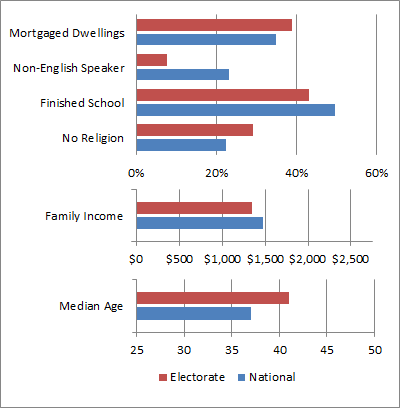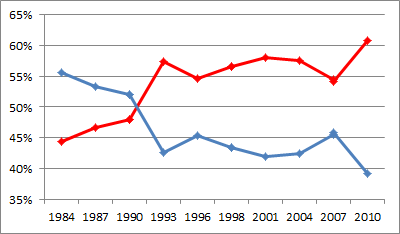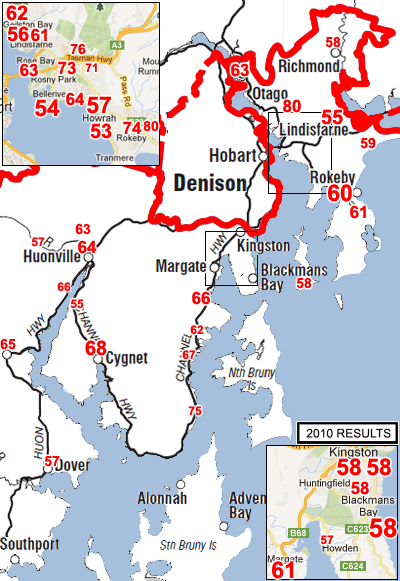As one of Tasmania’s constitutionally mandated five House of Representatives seats, Franklin has a lower than normal enrolment (72,500 compared with a national average of about 96,000) and has existed without interruption since the state was first divided into electorates in 1903. With Denison accommodating central Hobart and the suburbs on the western bank of the Derwent River, Franklin covers the eastern bank suburbs and areas immediately south of Hobart, starting from the outskirts township of Kingston, together with the unpopulated southern part of the World Heritage area in Tasmania’s south-west.
Labor first won Franklin at a by-election held two months after the election of Jim Scullin’s government in 1929, before losing it again amid the party’s debacle of 1931. It subsequently changed hands in 1934, 1946, 1969 and 1975, before remaining in the Liberal fold throughout the Fraser years and the first 10 years of the Hawke-Keating government. Labor finally won the seat when colourful Liberal member Bruce Goodluck retired at the 1993 election, which together a strong statewide shift to Labor delivered a 9.5% swing to their candidate Harry Quick. Quick maintained the seat with only mild swings either way at subsequent elections, although there were occasional suggestions he might be brought undone by internal party machinations. When his preselection appeared in danger ahead of the 2004 election, he was able to see off the threat partly by indicating that he might run as an independent.
After choosing his own time of departure at the 2007 election, Quick sought to keep the seat out of factional hands by promoting his staffer Roger Joseph as his successor. This was thwarted when a deal assigned Franklin to Kevin Harkins, state secretary of the Left faction Electrical Trades Union, and Bass to the Right-backed Steve Reissig. Objecting that Harkins was a “right thuggish bastard” who would lose the seat, Quick declared he would vote for the Greens. His attacks drew blood as newly anointed Labor leader Kevin Rudd sought to distance the party from unsavoury union associations, with Harkins carrying baggage from the 2003 Cole royal commission into the building and construction industry. Harkins’ position ultimately became untenable in July 2007 when the Australian Building and Construction Commission brought charges against him over an illegal strike. When he won preselection for the Senate ahead of the 2010 election, he was again rolled by the intervention of Kevin Rudd.
With Harkins gone and the election looming, the preselection was referred to the party’s national executive, which maintained the factional balance in choosing the Left’s Julie Collins, state party secretary and a strongly performing though unsuccessful candidate at the March 2006 state election. The loss of Quick’s personal vote combined with the manner of his departure resulted in Collins suffering a 3.1% swing to the Liberals, one of only four swings to the Coalition at that election. Coming off a suppressed base, she went on to enjoy a 6.8% swing at the 2010 election, the selection highest recorded by a Labor candidate. Collins was made a parliamentary secretary after the election, winning further promotion to the outer ministry in December 2011 as Community Services Minister.
The Liberals have preselected Bernadette Black, a Kingborough councillor who according to the Mercury “has made a name for herself as a spokesman for teenage mums after having her first child aged 16”. Black won preselection ahead of another Kingborough councillor, Nic Street.











Crikey is committed to hosting lively discussions. Help us keep the conversation useful, interesting and welcoming. We aim to publish comments quickly in the interest of promoting robust conversation, but we’re a small team and we deploy filters to protect against legal risk. Occasionally your comment may be held up while we review, but we’re working as fast as we can to keep the conversation rolling.
The Crikey comment section is members-only content. Please subscribe to leave a comment.
The Crikey comment section is members-only content. Please login to leave a comment.